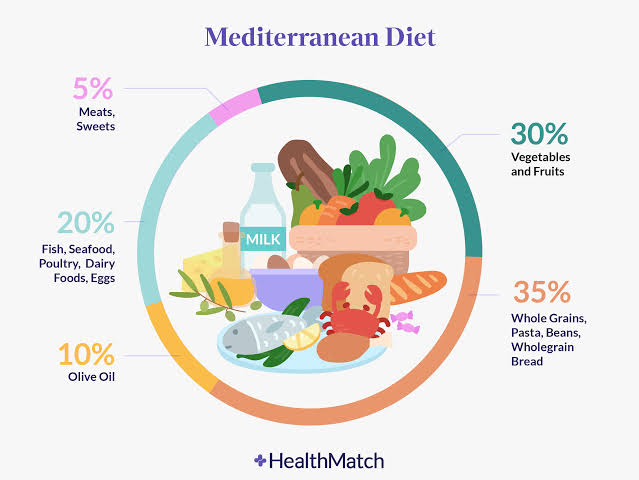The Mediterranean diet is a popular and well recognized eating plan due to its many proven health and longevity benefits. It takes its cues from the traditional diets of people in the Mediterranean region and promotes a varied and healthy diet. The Mediterranean diet is described in detail below.
Eat lots of fruits and vegetables; they are full of healthy nutrients like vitamin C and fiber.
Whole grains: Whole wheat, oats, and brown rice should be prioritized.
Olive oil is an excellent resource for the heart-healthy monounsaturated fats.
Protein sources are limited to healthier options like fish and chicken.
Greek yogurt and cheese are two examples of dairy that are often consumed in moderation.
Almonds, walnuts, and flaxseeds are all recommended as healthy nut and seed options.
Moderate use of red wine is recommended, especially with meals.
Important Advantages: – Lower risk of heart disease, thanks to the Mediterranean diet’s focus on healthy fats and fish.
Because of the variety of well-balanced and nutrient-rich foods it promotes, it can also aid in weight management.
Some research has found that persons who adhere to this diet have a lower risk of chronic diseases and a longer lifespan.
Flavorful Components: – Herbs and spices: Basil, oregano, garlic, and rosemary are utilized for flavor.
Tomatoes, olives, and capers are all favorites in Mediterranean cooking because they are fresh and flavorful.
Foods that are roasted or grilled: Flavors are improved with these cooking techniques.
Examples of Meals – For breakfast, try Greek yogurt with honey and berries, or whole grain toast with avocado and poached eggs.
For lunch, I had a salad with olive oil, balsamic vinegar, feta cheese, tomatoes, cucumbers, and mixed greens.
Dinner: Quinoa and steamed veggies with baked or grilled fish (like salmon or sardines).
This is the Recommended Book that Will teach you more on Mediterranean Diets that will Aid to Weight Loss, and Also let you know the benefits.

Nuts, fruit, and veggie sticks dipped in hummus make excellent five of the clock munchies.
Guidelines: – Moderate consumption of red meat: red meat is eaten only on rare occasions.
Avoid or reduce the intake of highly processed foods.
- Exercising regularly is a cornerstone of the Mediterranean way of life.
Cultural and Social components: The social and cultural components of eating, such as sitting down to a meal with loved ones, are an integral part of the Mediterranean diet.
Numerous scientific studies have linked this eating plan to improved health and a lower risk of chronic diseases including diabetes and some forms of cancer.
Personalization: The tenets of the Mediterranean diet can be modified to accommodate specific needs and dietary constraints.
If you have unique health concerns or dietary demands, it is important to talk to a doctor or a qualified dietitian before making any major changes to your diet.


